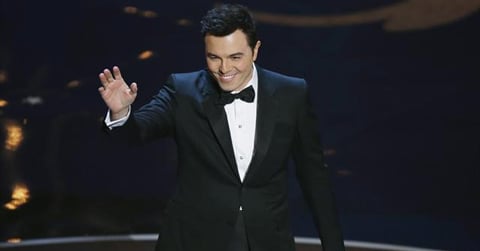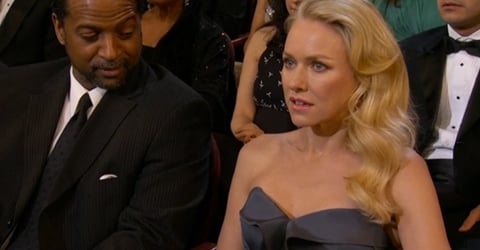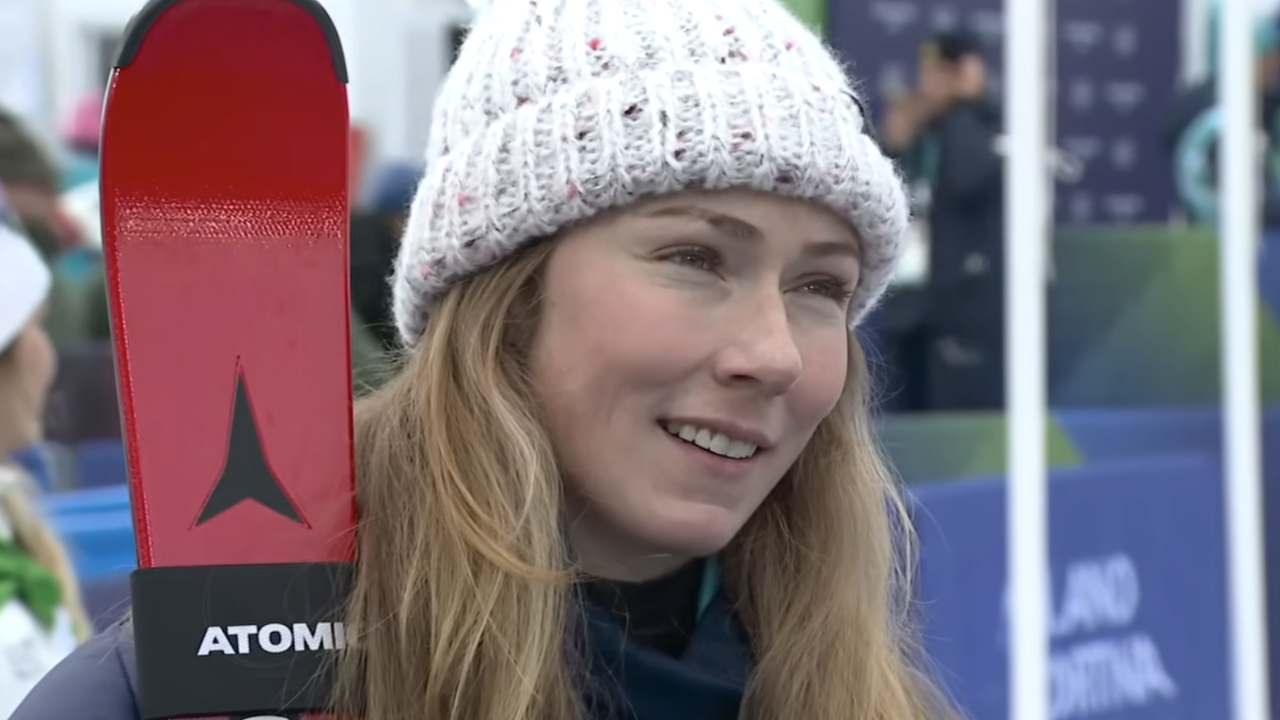Yes, Seth MacFarlane's Oscar Jokes Were Sexist, And Yes It Matters

Your Daily Blend of Entertainment News
You are now subscribed
Your newsletter sign-up was successful
Barely a year after firing Brett Ratner from his job producing the Oscars after an off-color joke, the Academy went ahead and embraced a host whose very presence seemed guaranteed to offend. Seth MacFarlane is a wildly popular Hollywood insider after a decade of Family Guy and last summer's Ted, but he's also a bomb-thrower and "equal-opportunity offender" who seemed to have no reason to leave his Nazi and Civil War jokes at home.
Obviously he toned it down a bit for the sake of the classy Academy affair and the older viewers, but when it came to jokes about women, MacFarlane was shockingly off-base. Our Mack Rawden already chimed in with his defense of MacFarlane's jokes, but Katey and Kristy-- the two proud feminists of the movie section-- had to step in and disagree. Why is a song called "We Saw Your Boobs" not just lame, as MacFarlane himself admitted in the number, but demeaning to the women he mentioned? Why is it uncool to chalk up Jessica Chastain's Zero Dark Thirty character to being a nag who won't let anything go?
If you want the short answer, it's "If you're going to make jokes at the expense of women, make them funny and original." But for the long answer, read our conversation below, and then join for more discussion in the comments.
KATEY: So Kristy, I feel like there are a million things to critique about Seth MacFarlane's hosting job last night, from the weirdly extended William Shatner cameo to the John Wilkes Booth joke that proved it really is too soon to joke about it. But, as ladies and as feminists, I feel like we've got our wheelhouse set up for us. Essentially: why on earth did everything feel so misogynistic last night?
KRISTY: The thing is, I'm totally aware that complaining about this is a trap. If you're a woman and you openly call yourself a feminist—which I do—then some people assume you have no sense of humor. I would offer Tina Fey and Amy Poehler as proof that's a tired and dumb stereotype. But the Oscars are meant to be a venue that celebrates people at the top of their field, and MacFarlane made it a frat party where women where literally reduced to their tits. I don't find that funny, especially since he name-checked The Accused in his Mr. Skin-styled rundown. I mean, that is a movie about how women being sexualized in society fuels rape culture! But on the other hand, if we stay silent about this, it's essentially implied consent or indifference.
KATEY: OK, so let's break down what we're talking about here. The easiest target, and the one he essentially set up for us, is the "We Saw Your Boobs" musical number, which is technically presented as a mistake he made in hosting, that William Shatner warns him against doing. It's a structure he set up for himself a lot of times throughout the night-- padding a risky joke either on the front or the back with some kind of disclaimer or shrug saying "hey, it doesn't really count!"
For me it's not so much that he even thought he could get away with it-- The Onion proves all the same that you can say crazy things couched in satire and pull it off. It was just confusing, and bizarre to start the Oscar show by having to follow this twisted logic of a Captain Kirk fantasy scenario. And then, of course, as you mentioned, the song just namechecked every woman who's ever shown her breasts onscreen-- even in movies speaking out against rape, like Boys Don't Cry.
Your Daily Blend of Entertainment News
Did the presence of Charlize Theron, Naomi Watts and Jennifer Lawrence in the fake reaction shots make it any better for you?
KRISTY: No, because they are in a shitty position. If they say they don't want to be a part of this, then they can be called humorless bitches that don't get the joke. So professionally, it makes sense for them to play along.
Photo Credit ©ABC

KATEY: A musical number like this pretty much confirms every fear I'd imagine a woman would have about doing a nude scene. You know that, somewhere, this song is going through the heads of some moviegoers-- and it's a really uncomfortable feeling. When Anne Hathaway was speaking out really smartly about the upskirt shots of her that went online, she pointed out how this kind of stuff just further commodifies women and damages them. I wonder what she'd say about this.
So moving forward, I totally missed the jab about Jessica Chastain's Zero Dark Thirty character being a typical woman who can't let things go. I still haven't watched it in context, but I have a feeling it doesn't play any better onscreen.
KRISTY: It doesn't.
KATEY: Mack, who wrote a defense of MacFarlane for us, says that joke isn't damaging because it's not the kind of thing that makes women feel bad about themselves or diminish their potential in the workplace. To quote, "It’s just a funny quirk that a sizeable percentage of women share, and if you don’t believe me, think about the random things your mom still brings up."
KRISTY: It's a tired stereotype of "the nag," and to reduce Jessica Chastain's Maya down to that is damaging because female protagonists in movies are in the minority to begin with. He might think he nipping at the heels of the big dogs, but women are horribly underrepresented in film. So, this isn't the same thing as Ricky Gervais mocking white male celebs who are forgiven all of their vices because we find them charismatic screen presences. This doesn't come off as a character like Gervais at the Globes or Stephen Colbert on his talk show. It just comes off as mean-spirited, and totally oblivious.
KATEY: I don't really see a whole lot of similarities to Ricky Gervais-- MacFarlane seemed to be leaning much less heavily on the "Oh, look how dangerous I am, speaking truth to power!" attitude that Gervais brought to the Globes. MacFarlane's humor, like Family Guy, was all over the place. And at least a handful of the gags were targeted at women in these really bizarre ways.
But, it's worth noting, we're at least somewhat in minority based on comments around here. To the people more inclined to agree with Mack about this stuff-- what's the key to figuring out why you and I are so irritated?
KRISTY: It's simple. Men and women don't play on the same playing field. Most movies star men. Most movies are directed by men, written by men, shot by men. It is a VERY male-dominated field. Moreover, actresses are held to a much higher standard of criticism for their looks, and a much higher moral standard--look at Kristen Stewart/Rupert Sanders or how people respond the stripper past of Channing Tatum versus Diablo Cody.
Basically, I disagree with Mack that these stereotypes and jokes aren't damaging. They absolutely are because they make these talented hard-working women jokes and sex objects at an event where they are meant to be lauded by a jury of their peers.
KATEY: And I want to add that, of course, women can be poked fun at and part of the joke and have a sense of humor-- like the awesome joke that Daniel Day-Lewis pulled out about him and Meryl Streep switching roles for The Iron Lady and Lincoln.
But I think the rule of thumb for these kinds of jokes is, "Is it essentializing women to a single attribute-- be it a stereotype about personalities or body parts? Then you probably shouldn't make it." And that's where I think MacFarlane failed-- not that he made a jokey song about women showing their breasts onscreen, but that it was ENTIRELY about that. And not that he made a joke about the female character of Zero Dark Thirty, but the entire punchline was a stereotype that's as untrue as most stereotypes.
KRISTY: Exactly. Joking about nudity could have been funny. To me, it's tricky to apply rules to comedy--what is and what's not acceptable--but I think it mostly hinges on execution. Here, the execution came off as completely sexist and misogynistic because it did reduce the women there--and by extension elsewhere--to tits and stereotypes with not layer of social commentary or satire.
NOTE: This is a good spot to link to The Atlantic's piece on the subject, especially this bit of the final paragraph:
Everything, including punchlines about the Jews cutting non-Jews out of Hollywood, snickers about women faking the flu to lose weight, and cracks that there's no need to try to understand what Salma Hayek's saying because she's so hot, is "OK." It's a free country, etc. But that doesn't mean those jokes aren't hurtful, obvious, or dumb. It doesn't mean they don't make the world a worse place. Humor, after all, can be an incredible weapon for social progress, but it can also be regressive: The more we pass off old stereotypes, rooted in hate, as normal—as MacFarlane did again and again last night—the longer those stereotypes, and their ability to harm people, will be in place.
KATEY: Let's close on a positive note-- what was your favorite awesome woman moment of the evening? Mine's probably Adele's entire acceptance speech, not because she did anything especially feminist, but because she rules.
KRISTY: There were so many to chose from! I was stoked about FLOTUS' surprise appearance. Meryl Streep cracked me up, and I loved Jennifer Lawrence fall and all. But I think I'd say my favorite awesome woman moment was Shirley Bassey because she owned that stage, and the night. She was everything in that moment!
KATEY: Shirley Bassey = best golden arm warmers of the night, by far.
